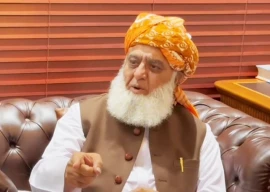
Serious doubts have been raised regarding the federal government's proposal for establishment of the Federal Constitutional Court (FCC) as the apex court of the country.
According to the draft of the proposed constitutional amendment bill, the jurisdiction of the Supreme Court will be curtailed and the FCC will be established in view of the Charter of Democracy signed between PPP's slain chairperson Benazir Bhutto and PML-N chief Nawaz Sharif in May 2006.
The FCC will hear cases filed under Article 184, 186 as well as appeals against high courts' decisions in exercise of jurisdiction under Article 199 of the Constitution.
The first FCC chief justice is proposed to be appointed by the president in consultation with the prime minister. Other judges will be appointed by the prime minister in consultation with the FCC chief justice.
It is proposed that the first appointment of judges in the FCC be made by the president in consultation with the FCC CJ. Later on the appointment of the FCC CJ will be made by a National Assembly committee comprising eight members nominated by the National Assembly speaker.
It is suggested that the number of FCC judges will be determined by an act of parliament.
It is proposed that the nominee should not hold any foreign nationality and is serving or has served as a Supreme Court judge. A high court judge having five years' experience or a lawyer having 15 years' practice may also be considered for appointment as an FCC judge.
The retirement age of an FCC judge will be 68 years. The term of FCC CJ will be three-year unless he reaches the age of 68 years before that.
The FCC chief justice is proposed to be the chairman of Judicial Commission of Pakistan (JCP). Two senior most judges of the FCC will also be part of JCP.
Changes have also been proposed in the composition of the Supreme Judicial Council. The FCC chief justice shall be the head of the SJC. The chief justice of Pakistan and two senior most CJs of high courts are also proposed to be the members of council.
A former top law officer said curtailing the jurisdiction of the Supreme Court will be a violation of basic structure of the Constitution.
He wondered how the executive could appoint the chief justice of the proposed apex court of the country, adding that the government wants to control the judiciary for the next three years.
Another lawyer said for the first time in 77 years the powerful circles have found a permanent solution for ensuring that cases of their interest are heard by handpicked judges.
"It has happened because for the first time in 77 years, judges have asserted their independence though the SC had not stood up for them. Why should there be any independent judge in the high court?" he questioned.
Former Sindh High Court Bar Association president Salahuddin Ahmed said that the proposed draft bill is a clear attack on the principle of separation of powers and independence of judiciary.
"It is even worse than extension or court-packing! It effectively turns all SC judges into OSDs [officers on special duty]," he added.
He said the SC will not listen to any petition involving fundamental rights or even appeals against order of the high courts whether they are tax cases, rent petitions or regulatory matters etc. All such cases will go to constitutional court (FCC).
"If the reason is that our courts are too political then how can having a new court appointed by a ruling party depoliticize them? If the reason is that litigations take too long, then how will adding another layer of courts on top of the SC will help?" he added.
Some lawyers said that internal rifts in the top judiciary are also weakening the institution. A lawyer said that instead of curtailing the SC's jurisdiction, the government should establish two courts of appeal.
Meanwhile, 114 lawyers have also issued a public statement, announcing that they do not accept the proposed amendment allowing transfer of high court judges from one province to another.
"[This move] is a mala fide attempt to further subvert not only judicial independence but also provincial autonomy. The judiciary is the custodian of the Constitution, and cannot be dealt with at par with the bureaucracy – which is subservient to the executive.
"Nor can the rights of ordinary litigants, entitled to access to justice, be jeopardized," they noted.

1721390241-0/BeFunky-collage-(20)1721390241-0-405x300.webp)
















COMMENTS
Comments are moderated and generally will be posted if they are on-topic and not abusive.
For more information, please see our Comments FAQ